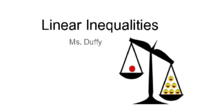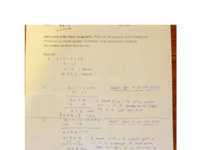Inequalities - Notes and Applet Fun!
Notes from first Linear Inequalities lesson -- 11th December 2017 Lesson -- COPY THESE
solutions to linear inequalities worksheet
Reading Inequality Symbols
We use symbols to describe different types of inequalities.
How does the symbol for "greater than or equal to" differ from the symbol for "greater than?"
Why do you think it differs in this way? Why is this is necessary?
Think about it before reading answer below.
-----------------------------------------------------------------------
The symbol for greater than or equal to has a line underneath the inequality symbol. This could represent half an equal sign (=) as x CAN be equal to the number on the other side of the symbol.
It is necessary to have different symbols because the idea of "greater than OR equal to" is much different than the idea of "greater than."
"Greater than or equal to" includes the number on the other side of the inequality whereas simply "greater than" excludes that number.
-Ms. Duffy
| Maths Language | English Language |
| 10 < 12 | 10 is less than 12 |
| 12 > 10 | 12 is greater than 10 |
| | 7 is less than or equal to 7 |
| | x is less than or equal to 7 |
| | 8 is greater than or equal to 8 |
| | x is greater than or equal to 8 |
| | |
| | |
Practice Reading Inequality Symbols
Graphing the Solution Set for Inequalities Part One
After solving an inequality, you are often asked to graph it.
Graphing inequalities a visual way of looking at all the possible answers using the number line.
When you graph an inequality, it does matter if your dot is filled in or open.
You use an open dot if
the solution uses the symbol for "less than" or "greater than."
You use a filled in dot if
the solution uses the symbol for "greater than or equal to" or "less than or equal to."
Why?
Think about it before reading answer below.
---------------------------------------------------------------------------------------
The filled in dot is representing that it can include this number, whereas the open dot is representing that this number itself should be excluded (the circle is surrounding this number but not including it).
Use the activity below to practice graphing solution sets.
-Ms. Duffy
Solving Inequalities
Now, we will look at actually solving an inequality.
As we did in class, when solving an inequality we move the numbers and variables around as we would if there was an equal sign. Making sure that whatever we do to one side we do to the other.
** One BIG Exception **
If we multiply or divide by a negative number we flip the inequality sign. Why? Think about it before reading answer below. -------------------------------------------------------- If we do not flip the inequality sign the inequality will no longer be true. When we multiply or divide everything by a negative all of the signs change - what was positive is now negative, and what was negative is now positive. Or, if both sides were positive then the larger positive is now largely negative. Use the applet below to practice solving inequalities. NOTE: When you put in your answer if it is a decimal, write it as a fraction. Ex. 0.33 write as 1/3 Also, if you have put in the incorrect answer nothing will happen, but when you put in the correct answer it will say CORRECT. Happy Practicing ! -Ms. DuffyPractice Solving Linear Inequalities (Level 1)
Notes to Come on The Next Section
Notes to come!

